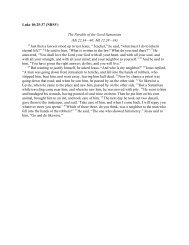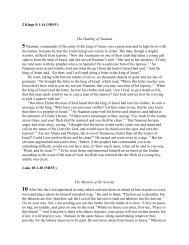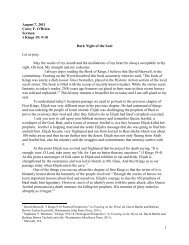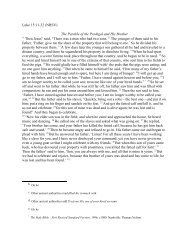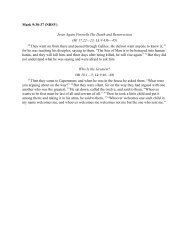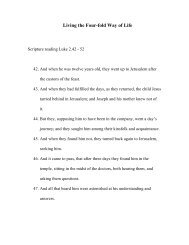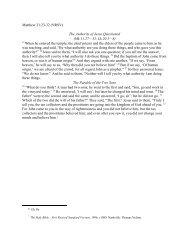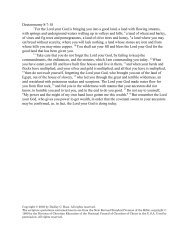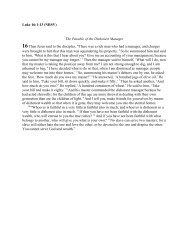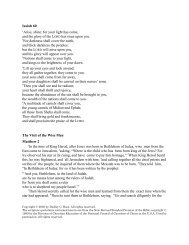Surely he has borne our infirmities and carried our diseases
Surely he has borne our infirmities and carried our diseases
Surely he has borne our infirmities and carried our diseases
You also want an ePaper? Increase the reach of your titles
YUMPU automatically turns print PDFs into web optimized ePapers that Google loves.
let t<strong>he</strong> Jews pay t<strong>he</strong> price in t<strong>he</strong>ir place.” I don’t know about you, but I just don’t find that a very<br />
satisfactory solution, eit<strong>he</strong>r.<br />
Every time we try to give an explanation to why God causes suffering we are going to<br />
end up in just such a perverted place. And maybe that ought to convince us that we are asking<br />
t<strong>he</strong> wrong question, t<strong>he</strong> wrong question of God, <strong>and</strong> t<strong>he</strong> wrong question of t<strong>he</strong> Bible. For, if we<br />
look carefully, t<strong>he</strong> Bible, as God’s revelation, often cuts against t<strong>he</strong> grain of <strong>our</strong> knee-jerk<br />
reading of it. Often we don’t see it because we read into t<strong>he</strong> Bible what we expect to find.<br />
We too readily assume that accounts of t<strong>he</strong> suffering servant, or Jesus’ death are just<br />
special cases of deserved suffering. Sometimes we assume it so much that those are t<strong>he</strong> answers<br />
we read t<strong>he</strong> text to find, <strong>and</strong> we fail to see that this amazing piece of poetry is answering a<br />
different question altoget<strong>he</strong>r. God simply doesn’t answer why <strong>he</strong> causes or allows suffering.<br />
That may be pretty frustrating, but God just doesn’t answer those questions.<br />
But God does answer t<strong>he</strong> question of what <strong>he</strong> tries to make out of t<strong>he</strong> suffering,<br />
especially w<strong>he</strong>n it is we human beings who cause it. People caused t<strong>he</strong> holocaust. People<br />
crucified Jesus. And people struck <strong>and</strong> afflicted <strong>and</strong> bruised t<strong>he</strong> suffering servant in this<br />
morning’s passage. T<strong>he</strong>re was transgression to spare. That part we get right. But t<strong>he</strong><br />
transgressions are to be found in t<strong>he</strong>se very actions against t<strong>he</strong> innocents—t<strong>he</strong> Jews, t<strong>he</strong><br />
suffering servant, <strong>and</strong> Jesus himself. Human sinfulness, human fallenness is t<strong>he</strong> human<br />
condition, but it manifests itself very often in actions that cause suffering to those who are t<strong>he</strong><br />
most innocent.<br />
T<strong>he</strong>re are many reasons we do it. Sometimes it’s lust for power. Sometimes it’s fear.<br />
Sometimes it’s insecurity. Sometimes it’s to distract us from <strong>our</strong> real problems. Sometimes it’s<br />
to blame ot<strong>he</strong>rs for <strong>our</strong> problems. Interestingly, though, w<strong>he</strong>n we perpetrate suffering mostly <strong>our</strong><br />
truest reasons are hidden from <strong>our</strong> sight. Germany blamed t<strong>he</strong> Jews, among ot<strong>he</strong>rs, for <strong>he</strong>r post<br />
World War I problems. Both Pilate <strong>and</strong> Caiap<strong>has</strong> saw Jesus as a threat to peace <strong>and</strong> stability.<br />
Neit<strong>he</strong>r Germany nor Jerusalem said, “Let’s kill some innocents.” That’s what t<strong>he</strong>y did. We can<br />
argue that t<strong>he</strong>y should have seen it for what it was. But t<strong>he</strong> fact is that t<strong>he</strong>y deluded t<strong>he</strong>mselves<br />
into seeing a perversion as perfectly reasonable. And we should be cautious in saying how much<br />
t<strong>he</strong>y missed t<strong>he</strong> obvious, for we may well be missing such obvious things <strong>he</strong>re <strong>and</strong> now. T<strong>he</strong><br />
moral of this story may be how hidden from us are t<strong>he</strong> obvious things we miss.<br />
And that’s w<strong>he</strong>re God comes into t<strong>he</strong> story. God’s <strong>he</strong>art is in a state of perpetual<br />
brokenness for t<strong>he</strong> anguish that we cause. God weeps day <strong>and</strong> night for t<strong>he</strong> pain we suffer <strong>and</strong><br />
t<strong>he</strong> pain we cause. And w<strong>he</strong>n God can, <strong>he</strong> takes that pain <strong>and</strong> suffering <strong>and</strong> tries to expose it to<br />
us for what it is, tries to un-cloud <strong>our</strong> vision, tries to undermine <strong>our</strong> obscuring logic.<br />
Isaiah’s suffering servant is one of t<strong>he</strong> clearest examples of God’s attempt to illuminate<br />
<strong>our</strong> situation. T<strong>he</strong> fact that we most easily read t<strong>he</strong> story as how God made t<strong>he</strong> servant suffer in<br />
<strong>our</strong> place shows just how persistent is t<strong>he</strong> veil on <strong>our</strong> eyes. T<strong>he</strong> suffering servant is not a story<br />
about God punishing an innocent ot<strong>he</strong>r in <strong>our</strong> stead. It is a story about how God shows us t<strong>he</strong><br />
death <strong>and</strong> destruction we cause, <strong>and</strong> t<strong>he</strong>n it is a story about how God redeems it, turns it into life.<br />
As a sidebar <strong>he</strong>re let me be clear. Redemptive suffering <strong>has</strong> gotten a very bad reputation,<br />
<strong>and</strong> it is absolutely well-deserved. T<strong>he</strong> suffering we are talking about is not caused by God. It is<br />
caused by people. And t<strong>he</strong> redemption isn’t in saying that t<strong>he</strong> suffering is something good to<br />
have happened. T<strong>he</strong> suffering we cause is bad, period. What good thing God does, t<strong>he</strong><br />
redemption God works, if you will, is to shine a light on how we cause t<strong>he</strong> suffering, to unveil of<br />
deluded sight, <strong>and</strong> also to say that t<strong>he</strong> suffering is not t<strong>he</strong> end of t<strong>he</strong> story. Out of death, God<br />
will create life.<br />
3



